I start work today as an Enterprise Fellow at the University of South Australia in Adelaide, South Australia’s City West campus (Academic unit: Creative-Architecture). Happy to talk about collaborative projects on architectural history, digital heritage, and serious games.. staff webpage at https://people.unisa.edu.au/erik.champion
Category Archives: Academic
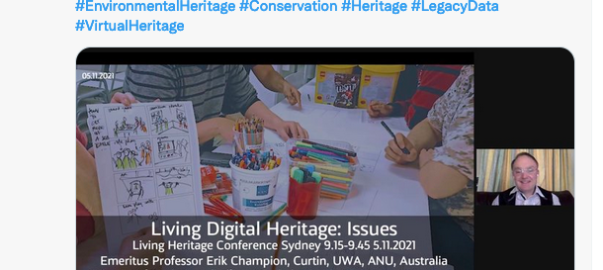
Living Digital Heritage 2021
I was given the honour of opening Living Digital Heritage conference with a keynote today and full congratulations to Frederik Hardtke and the other organizers at Macquarie University’s Centre for Ancient Cultural Heritage & Environment (twitter @cachemq) in Sydney, a great range of papers, all presented on Zoom. Finishing Sunday 7 November (when I fly to South Australia to take on a new role so I may miss a little of it).
If you are interested you may be able to follow via the above twitter links, I don’t know if they still accept registration but it was free.
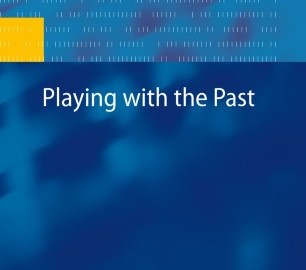
2nd edition, Playing With The Past, 2022
Today I agreed to complete a 2nd edition of “Playing With The Past” – Springer persuaded me there was a market for an updated book due to over 10,000 downloads. But I know there is *a lot* to update over the last 11 years. Sigh. Time for some surgically precise, concise, editing.
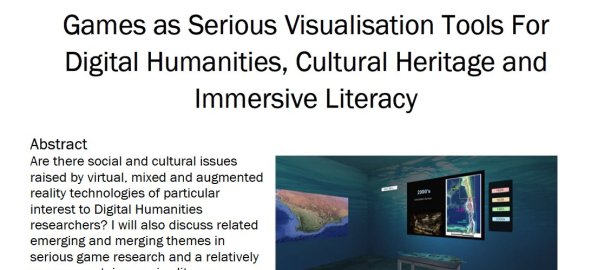
Invited Talk in Austria (virtually)
I’m giving a virtual lecture for DHGraz Wednesday 6 October 2021 (tomorrow): “We’re delighted to welcome @nzerik this Wednesday, who will open our Lunchtime Lecture series with an online talk on “Games as Serious Visualisation Tools For Digital Humanities, Cultural Heritage and Immersive Literacy”
More info: https://informationsmodellierung.uni-graz.at/de/neuigkeiten/detail/article/online-lunchtime-lecture-30.-juni-2021-1200-uhr/
Not recorded but slides are here https://www.slideshare.net/nzerik/games-xr-dhgraz-talk-06102021
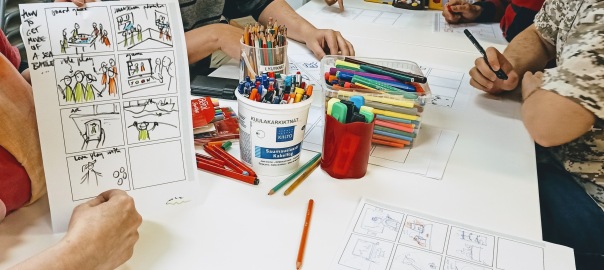
My trip to Finland
Thanks to the University of Jyväsklyä for inviting me here to central Finland. This is a summary of my time here and upcoming calendar events:
31/8 arrive, 3 plus hour train to Jyväsklyä.
1/9 ARC Cultural Data Engine meeting (Melbourne).
8/9 ARC Cultural Data Engine meeting (Melbourne).
9/9 Departmental staff meeting.
10/9 Virtual talk, University of Hong Kong.
14/9 Talk and workshop (photo above) at Digi & Game Center centre.
15/9 Invited questioner, ERC trial for grant interview process.
20-22/9 Two day stay at Rovaniemi, Arctic Circle. Museums.
–This week finish book chapter on difficult heritage-done.
28/9 UTS Zoom meeting-mentoring.
29/9 Online talk to students, postgraduate researchers.
30/9 Meet the new Dean.
1/10 Essay for Tencent, Book proposal review done.
4/10 Train to Tampere, Centre of Excellence in Game Culture Studies. Invited virtual keynote, ISMAR 2021: mrICHE 2021 workshop.
6/10 Invited talk, virtual, Austrian Centre for Digital Humanities, University of Graz.
8/10 train to Helsinki.
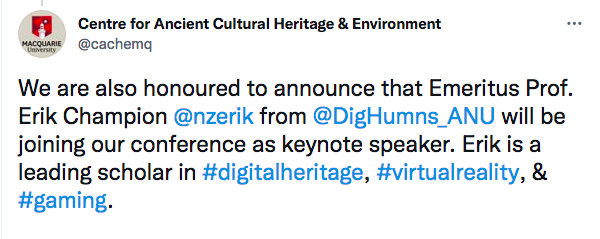
Keynote and CFP: Living Digital Heritage
Call for papers!
Living Digital Heritage Conference: “Integrating the Past into the Present and Future”
Friday 5 – Sunday 7 November 2021, Sydney/Virtual
Hosted by the Centre for Ancient Cultural Heritage and Environment (CACHE), Macquarie University
If interested please send your abstracts (panel or paper) to https://event.mq.edu.au/living-digital-heritage by 1 October.
I am happy and honoured to say that I have been invited to keynote, thank you to the organizers and for their tenacity in running this conference.
Normal service to resume
This weekend I leave for the “Athens of Finland”, that’s right, the Aalto city, Jvyäskylä, to be a visiting fellow. The University of Jvyäskylä is a partner in the Centre of Excellence in Game Culture Studies (https://coe-gamecult.org). I’ll still have news and posts to update this site with but postings may be irregular (again) for awhile.
To the journals and book editors and conference organizers who seem to regularly ask for my time, I’m sorry, I’m cutting back for the next few months and will only take on assignments close to my heart and/or that I have already promised to complete. I have several book projects and some small commissions that should take precedence.
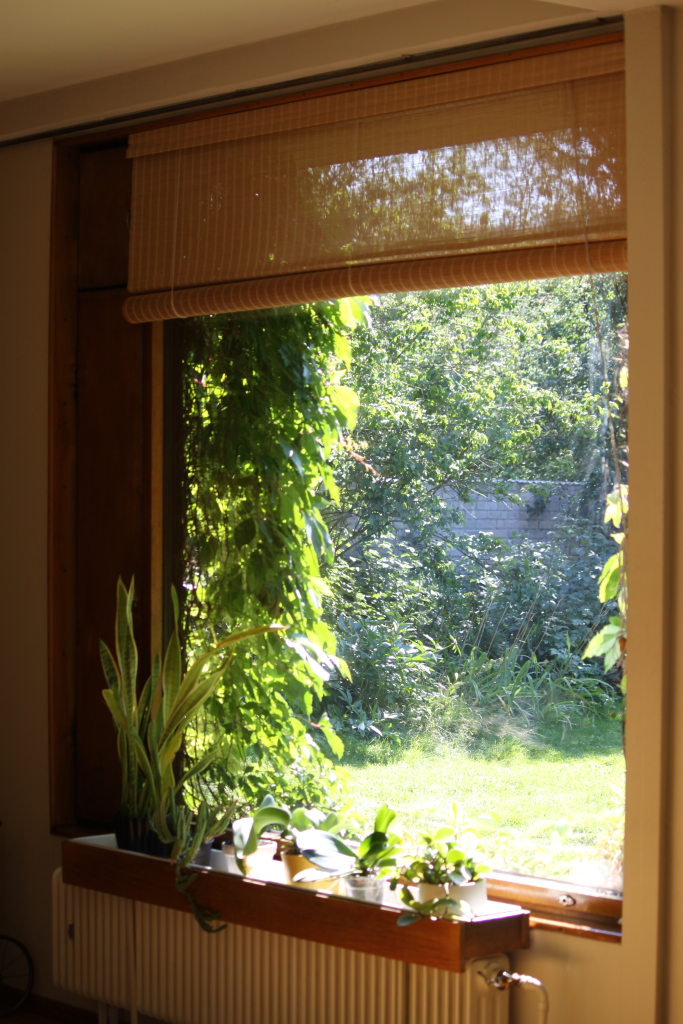
A view from Aalto’s home in Helsinki. Photo taken a decade ago by me.
update: ‘Rethinking Virtual Places’ Proof Approved
I mentioned in the below post that I was on the home stretch with this book (in the Indiana University Press Spatial Humanities series), final proof was approved by me this week. I also noticed it was over 107,000 words. Thanks to Dean and Professor Marc Aurel Schnabel for the comments on the back.
“An essential contribution to a very current topic.” —Marc Aurel Schnabel, Victoria University of Wellington
If anyone wishes to review or consider ‘Rethinking Virtual Places‘ for courses please contact Indiana University Press or email me.
Australian Cultural Data Engine-2 year LIEF
Just been given the green light to be officially on the following #ARC #LIEF grant: “Australian Cultural Data Engine for Research, Industry and Government” (announced in December but took this long):
“…Australian Cultural Data Engine for Research, Industry and Government. The project aims to develop an Australian Cultural Data Engine (ACD-Engine), which will be an open software engineering facility that interacts with leading existing cultural databases in architecture, visual and performing arts, humanities, and heritage to build a bridge to information and social sciences. The ACD-Engine will unify and expand these disparate and previously unconnected systems to allow advanced analysis techniques to be performed. It will deliver innovative and searchable formats that ensure interoperability, improved search, interactive design and interpretation aids that will benefit the policy and planning for national and international alignments between researchers, industry and government.”
This will be my fourth Australian Research Council grant (Chief Investigator)* since 2018. The University of Melbourne leads this grant, it runs for two years.
*Also an expert advisor on 5-year ARC Indigenous Discovery grant.

Virtual Heritage: A Guide
“Virtual Heritage: A Guide” is published and open access!
Why did we write it? For all those interested in an introduction to virtual heritage, but facing steep purchase costs for academic books, so it is especially suitable for university undergraduate courses. Download what you need, for free.
And given it was written from go to whoa in less than a year and to a tight word limit, I am very grateful to the authors for their time…
Cite: Champion, E. M. (ed.) 2021. Virtual Heritage: A Guide. London: Ubiquity Press. DOI: https://lnkd.in/gNkNWiB. License: CC-BY-NC.

Playing With The Past 2nd ed.
Are second editions of specialist academic books worth the rewrite? Springer asked me to consider a second edition of Playing With the Past (https://lnkd.in/gXYH5Uy), as 10,000 chapters have been downloaded..but it requires some work to update it.
Apparently, 20% can be rewritten but as most of the main chapters were written in 2003-4, updated before publication in 2011, to update to 2021 will be quite some work. There weren’t so many books and papers in the area when I started! On the other hand it is an opportunity to review what I was trying to determine in 2001-2004 during my PhD candidature. And I would love to replace the original cover. Decisions, decisions!
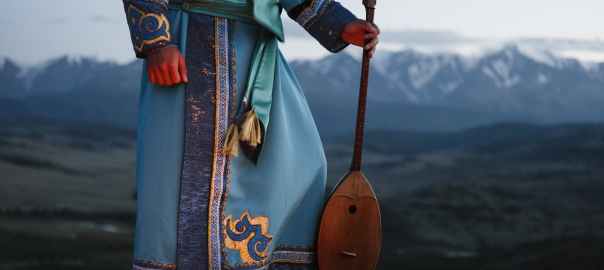
digital games and intangible heritage
If you have or know of digital games that helped in the “regeneration” of intangible heritage, as well as related organizations, projects and websites or organizations, please let me know…I have been asked to present on this topic on Monday 5 July to overseas gaming companies and academics..
Here was my initial beginning list (woefully incomplete but will soon expand):
Heritage organisations
- UNESCO Chairs … I am investigating, most lists of Chairs and Networks are a little out of date and a few seem to have changed or expanded their remit.
- Historic Urban Landscapes [UNESCO-associated]-none I know of use digital games but I think that would be useful…
- ICOMOS none I know of but it is a huge association.
- Europeana/CARARE/ARIADNE are more into digital archives/preservation?
Game organisations
- The International Game Developers Association (IGDA) Serious Games SIG http://www.digra.org/the-association/
- Games For Change (https://www.gamesforchange.org/ Board)
- Digital Games Research Association – DiGRA http://www.digra.org/the-association/chapters/united-kingdom-digra-chapter/
- VSMM http://vsmm.org/ (website has problems, I think I am still on the board of directors and I am not sure what the current status is)
- Serious Games for Cultural Heritage: the GaLA Activities appears to be finished..
Universities Research or Courses
- Skövde seems to be entering this area, Masters degree: Digital Narration: Game and Cultural Heritage https://www.his.se/en/education/game-development/digital-narration-game-and-cultural-heritage-masters-programme-digba/ Academic: https://www.his.se/en/about-us/staff/lissa.hollowayattaway/
- Genoa https://elios.diten.unige.it/members/
- Ball State University IDIA Lab https://idialab.org/services/
- University of York https://idialab.org/services/
- I am not sure they research games but they have employed an RA from this area https://www.qeh.ox.ac.uk/content/oxford-digital-diplomacy-research-group
- Glasgow School of Art MSc Serious Games and Virtual Reality https://www.gsa.ac.uk/study/graduate-degrees/serious-games-and-virtual-reality/
Games
I am going to include Never Alone. There are at least 6-12 in my head that I need to review to see if they really were “regenerating” intangible heritage..
cfp soon: Living Digital Heritage
Macquarie University in Sydney, NSW, Australia, plan to hold the above conference 5-7 November 2021 in Sydney Australia (and remotely). I imagine the CFP will be out soon, website is at:
The Macquarie University Simulation Hub
“Integrating the Past into the Present and Future”
Modern, innovative data collection and digital visualisation capabilities are able to capture ancient artefacts and structures, contexts, and traditions faster and in greater detail than ever before. Their sophistication and multi-dimensionality promise engagement with the past at many levels offering opportunities for deeper analyses and experiences to increasingly broader audiences.
This conference will be organised and hosted by the Centre for Ancient Cultural Heritage and Environment (CACHE). CACHE is a multi-disciplinary research centre focused on research on cross-cultural interaction in ancient cultures from Western Europe to China. Concentrating not only on the history of the societies concerned, but on the languages used, with a special focus on the close study of physical artefacts from antiquity. CACHE engenders transdisciplinary research into ancient knowledge by gathering leading MQ researchers across several disciplines (archaeological science, ancient history and literature, bioarchaeology, biology, environmental sciences) and departments (Human Sciences, International Studies, Biological Sciences, Environmental Sciences, Ancient History, Geography and Planning). CACHE particularly welcomes contributions reflecting the Indigenous Australian context – submissions concerned with Indigenous issues are especially relevant to the symposium and will be warmly welcomed.
#CFP Web3D
CFP Web3D: “A Shared 3D Workspace” Virtual Conference (web3d.siggraph.org)
The goal of the conference is to share innovative and creative ideas about web-based interactive 3D applications, including content creation, 3D printing, fabrication, publishing technologies, web tools, annotation, VR/AR, rendering, and many others. This year the conference will be held in full virtual mode, next November 8-12, 2021.
Here the important dates:
July 30 submission deadline
August 2 bidding deadline
August 31 reviews assignment
September 1 reviews due
Visiting Fellowship to Finland
Received a Visiting Fellow invite to the University of Jyväskylä, Finland (member of the Centre of Excellence in Game Culture Studies), very honoured.
I am just wondering if
- The Australian government will let me leave.
- Some of this can be done remotely as stretching the funding to cover all the costs (and 2 weeks compulsory hotel stay in quarantine on my return) will be difficult.
- I can visit colleagues in Europe over the September-October period.
- There are new and specific Covid-era visa requirements in Finland.
“Rethinking Virtual Places” can be ordered in September
Out in November, purchasable in September. Contact IUP for reviewer copies “Rethinking Virtual Places” (in the IUP Spatial Humanities series) https://iupress.org/9780253058355/rethinking-virtual-places
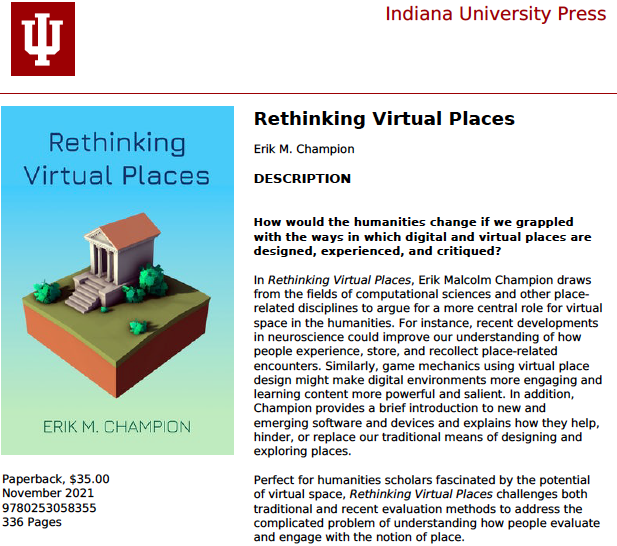
update: “Virtual Heritage: A Guide”
Dear Rosa and Andrea (and Michael)
Thanks to the colleagues and co-authors who helped inspired me to edit a concise book for students that will be open access (i.e. free PDF downloads).
Virtual Heritage: A Guide will be available on Thursday 22 July 2021 at https://www.ubiquitypress.com
I’d appreciate any feedback from staff or students for future editions.

Virtual Heritage: A Guide
I have been informed, that if there are no major holdups the above will be available as a free online book from Ubiquity Press in July 2021. Cover image courtesy of Michael Carter.
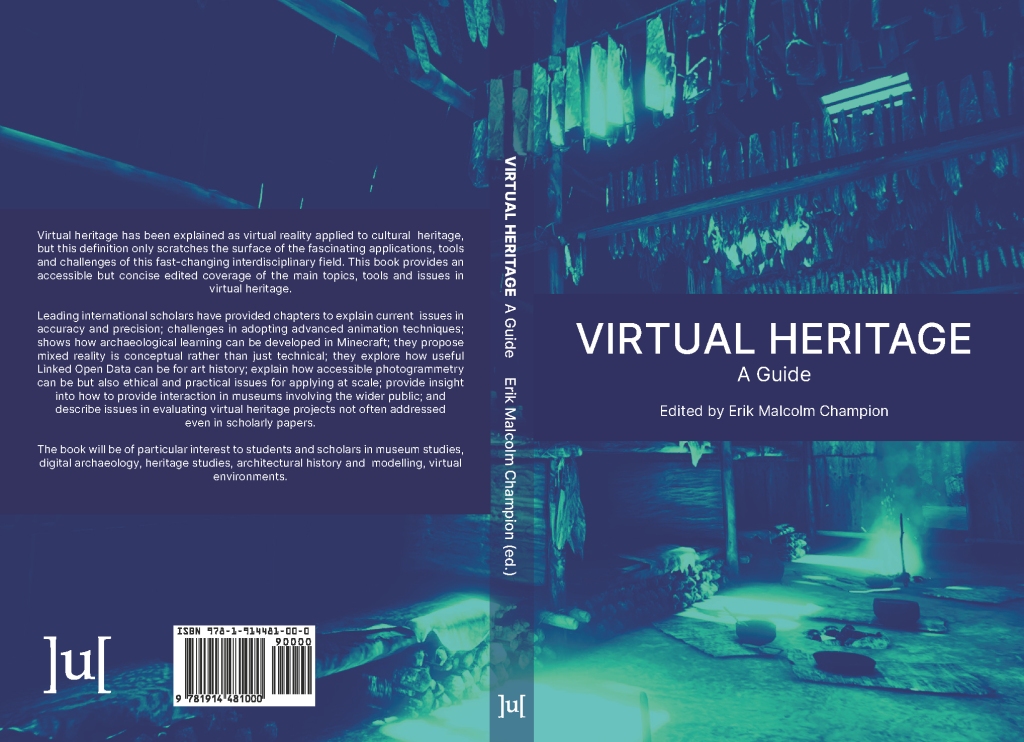
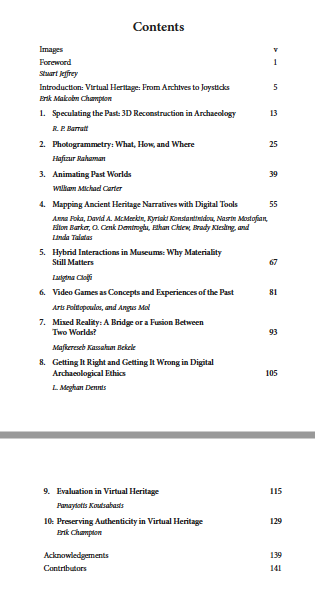

“Workshopping Board Games for Space, Place, and Culture” revised chapter, authored with Juan Hiriart, for “Playing Place” (edited by Medina Lasansky and Chad Randl, MIT Press) sent off today. Each chapter has a 1000 word limit, I believe. Took me some time to trim this! Great to work with Juan on a chapter, I think our different strengths blend well. When (or if?) the book appears on MIT Press I will add another post, the list of authors and topics looks really good, possibly essential reading if you are into boardgames, or are not, but want to know why so many people are …
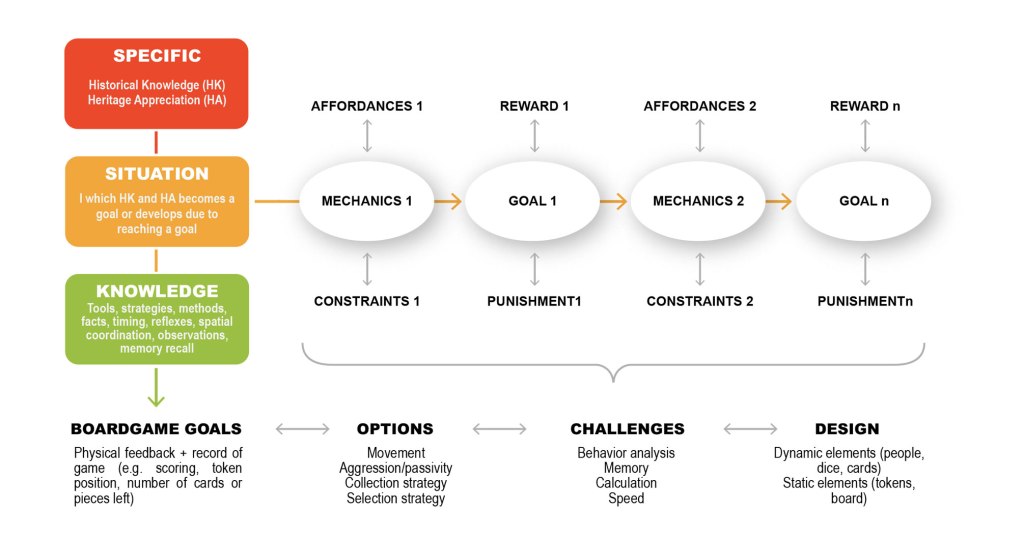
Workshopping Board Games for Space, Place, and Culture
Conveying built heritage values and historical knowledge through boardgame design may seem an odd decision. Communicating space, place, and culture through play is a challenge let alone through a medium inherently incapable of evoking the direct experience of inhabitation and architecture as a spatial art. Boardgames are engaging, social, quick to make, and fast to learn, intuitive or nuanced. From the complex to the spontaneous, boardgames can be effective, visceral tools for cultural immersion, challenging cultural assumptions and preconceptions, encouraging discussion and collaboration between players, provoking insight and enjoyment with simple props or intricate rules.
The following explains our experience hosting participative design workshops with historians, archaeologists, and heritage professionals. In small groups of three to four people, participants determine the design decisions, discussing and solving problems that often arise in an iterative process where historical research, game design, and play-testing both blend and butt heads.

2021: my year in print
What have I been doing this year? Playing a lot of piano, badly. But also (and I hope to add 2 journal articles and a book project and a serious game design project to this mix):
Invitations:
- Invited CI, ARC LIEF Grant LE210100021. $440,000. “Australian Cultural Data Engine for Research, Industry and Government.” Joining as a Chief Investigator, 26 April 2021. Led by Prof Rachel Fensham, Melbourne.
- Invited CI, Australian Research Data Commons (ARDC) platforms grant: Time-Layered Cultural Map of Australia 2.0 $100,000. 25/11/2020. https://ardc.edu.au/news/new-data-projects-will-help-transform-australian-research/
- Invited reviewer, Springer-Nature.
- Invited onto the European Science Foundation College of Expert Reviewers.
- Invited to speak to New South Wales Local Studies Librarians group, “Virtual heritage: tools, projects, hopes and challenges,” Zoom, 23 March 2021.
- Invited guest lecturer and tutor, Data Science Visualisation, Science & Engineering, Curtin University.
- Invited to Professor of Design interview panel, SUSTech, China, by Dean Thomas Kvan.
- Invited advisor for Swedish-Finnish grant application: PLATYPUS Engaging diverse publics through participatory play in heritage institutions, led by Uppsala University.
- Opening speaker, invited, webinar on smart tourism. ASEAN Australia Smart Cities Webinar Series Part 7: Promoting Smart Tourism Recovery via Virtual Reality. ZOOM webinar 2 March 2021. Organiser: Asian Development Bank.
- Invited to speak at University of Aberdeen Academic Forum and New South Wales Local Studies Librarians group-Zoom (date?).
- Interviewed for Canvas8 magazine. Quine, O. (2021). Are Britons ready for virtual holidays? canvas8. Retrieved from https://www.canvas8.com/content/2021/03/23/britons-virtual-holidays.html
- Interviewed by UNSW students on the subject of virtual tourism.
- Invited to co-chair the EuroMed2020 conference www.euromed2020.eu, Springer-Nature LNCS. Co-chairs include Professor Marinos Ioannides, ERA and UNESCO of Chair Digital Cultural Heritage, Mrs Eleanor Fink, USA, former Getty Digital Techs Director and inventor of Object-ID standard, Professor Lorenzo Cantoni from Switzerland, UNESCO Chair in ICT.
2021 PUBLICATIONS
Conference Proceedings (as Book):
- Ioannides, M., Fink, E., Cantoni, L., & Champion, E. (Eds.) (2021). Digital Heritage. Progress in Cultural Heritage: Documentation, Preservation, and Protection. 8th International Conference, EuroMed 2020, Virtual Event, November 2–5, 2020, Revised Selected Papers. DOI:10.1007/978-3-030-73043-7. ISBN 978-3-030-73043-7.
Published articles
- Rahaman, H., Johnston, M., & Champion, E. (2021). Audio-augmented arboreality: wildflowers and language. Digital Creativity, 1-16. https://doi.org/10.1080/14626268.2020.186853
- Champion, E. (2020). Culturally Significant Presence in Single-player Computer Games. Journal on Computing and Cultural Heritage, 13(4). DOI: 10.1145/3414831. https://dl.acm.org/doi/10.1145/3414831
- NB AWARD: in 2021 this paper won Virtual Archaeology Review Journal’s 2020 Paper of the Year. “Survey of 3D digital heritage repositories and platforms”, by Erik Champion and Hafizur Rahaman. DOI: https://doi.org/10.4995/var.2020.13226
Published Fully Referred Conference Papers
- Champion, E., Kerr, R., McMeekin, D., & Rahaman, H. (2020, 2-5 November 2020). Time-Layered Gamic Interaction with a Virtual Museum Template. Paper presented at the EuroMed 2020 Conference, Online/Cyprus. Revised Selected Papers. Springer-Nature. Published in 2021.
2021 Conference and Journal Reviewer
- Invited committee member, Australian Museums & Galleries Association (AMaGA) National Conference (Perth).
- Invited onto Program Board of Culture & Computing 2021 Conference, Springer ( HCI International).
- Invited reviewer, Springer-Nature Scientific Reports.
- Invited reviewer, the Journal of Open Archaeology (De Gruyter).
- Invited reviewer, CAA2021.
2021-22 PUBLICATIONS IN PRESS
Books in press
- Champion, E. (2021: November). Rethinking Virtual Places. Indiana University Press, Spatial Humanities series.
- Champion, E. (Ed). (2021: May). Virtual Heritage: A Guide. Ubiquity Press, London.
- Champion, E. (Ed). (2022: pending). Screen Tourism and Affective Landscapes.
- Champion, E., & Hiriart, J. (Eds.). (2022: in press). Assassin’s Creed in the Classroom, Museum, and Gallery: De Gruyter: Video games and the Humanities series, 18 chapters, 25 international authors.
Book Chapters in press
- Champion, E., Nurmikko-Fuller, T., & Grant, K. (2022: invited). Chapter 12 Alchemy and Archives, Swords, Spells, and Castles: Medieval-modding Skyrim. In R. Houghton (Ed.), Games for Teaching, Impact, and Research UK: De Gruyter.
- Champion, E., & Hiriart, J. (2022). Workshopping Board Games for Space Place and Culture. In M. Lasansky & C. Randl (Eds.), Playing Place: Board Games, Architecture, Space, and Heritage. Cambridge, Massachusetts, USA: MIT Press.
- Champion, E. (2022). Reflective Experiences with Immersive Heritage: A Theoretical Design-Based Framework. In A. Benardou & A. M. Droumpouki (Eds.), Difficult Pasts and Immersive Experiences. London, UK: Routledge.
- Champion, E. (2022). Not Quite Virtual: Techné between Text and World. In B. Mauer & A. Salter (Eds.), Reimagining the Humanities. Anderson, South Carolina, USA: Parlor Press.
- Champion, E. (2021: pending). Biodiversity and Cultural Diversity: Virtual opportunities. In E. Wandl-Vogt (Ed.),Biodiversity in connection with Linguistic and Cultural Diversity. Vienna, Austria.
- Champion, E. (2021: pending). Workshopping Game Prototypes for History and Heritage. In Digital Humanities book, Politecnico di Torino, Italy. Aracne Publishing Company. Chapter.
Conference activities to take place
- Wright, H., et al., 2021. S12: Digital Infrastructures and New (and Evolving) Technologies in Archaeology (Roundtable). CAA2021: Digital Crossroads. Cyprus/Online. https://2021.caaconference.org/sessions/ 14-18 June.

